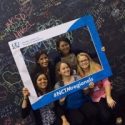The Council of Student Teachers of Mathematics (CSTM) creates an inviting atmosphere for Math Education majors at The College of New Jersey.
President Siddhi Desai and Vice President Amanda Soliman, both from the Class of 2017, founded the Council to bring together math secondary education majors at TCNJ and form a network of future match teachers. Former math faculty member Dr. Farshid Safi and current advisor Dr. Cathy Liebars had encouraged Desai and Soliman to start the student organization and establish it as a chapter of the National Council of Teachers of Mathematics (NCTM). Dr. Liebars remembers, “When Siddhi and Amanda came to me and Dr. Safi with the idea of starting a student organization that would be an affiliate of NCTM on campus, I was thrilled! As a student affiliate, the organization gets a free membership in NCTM, which is the leading organization for mathematics teachers. It has numerous resources for pre-service and in-service math teachers to learn more about the profession and stay current on mathematics education resources,” says Dr. Liebars.
Shortly after its founding, the Council was indeed recognized as a student affiliate of the NCTM – the first in the state – at the 25th annual conference of the Association of Mathematics Teachers of New Jersey (AMTNJ). The 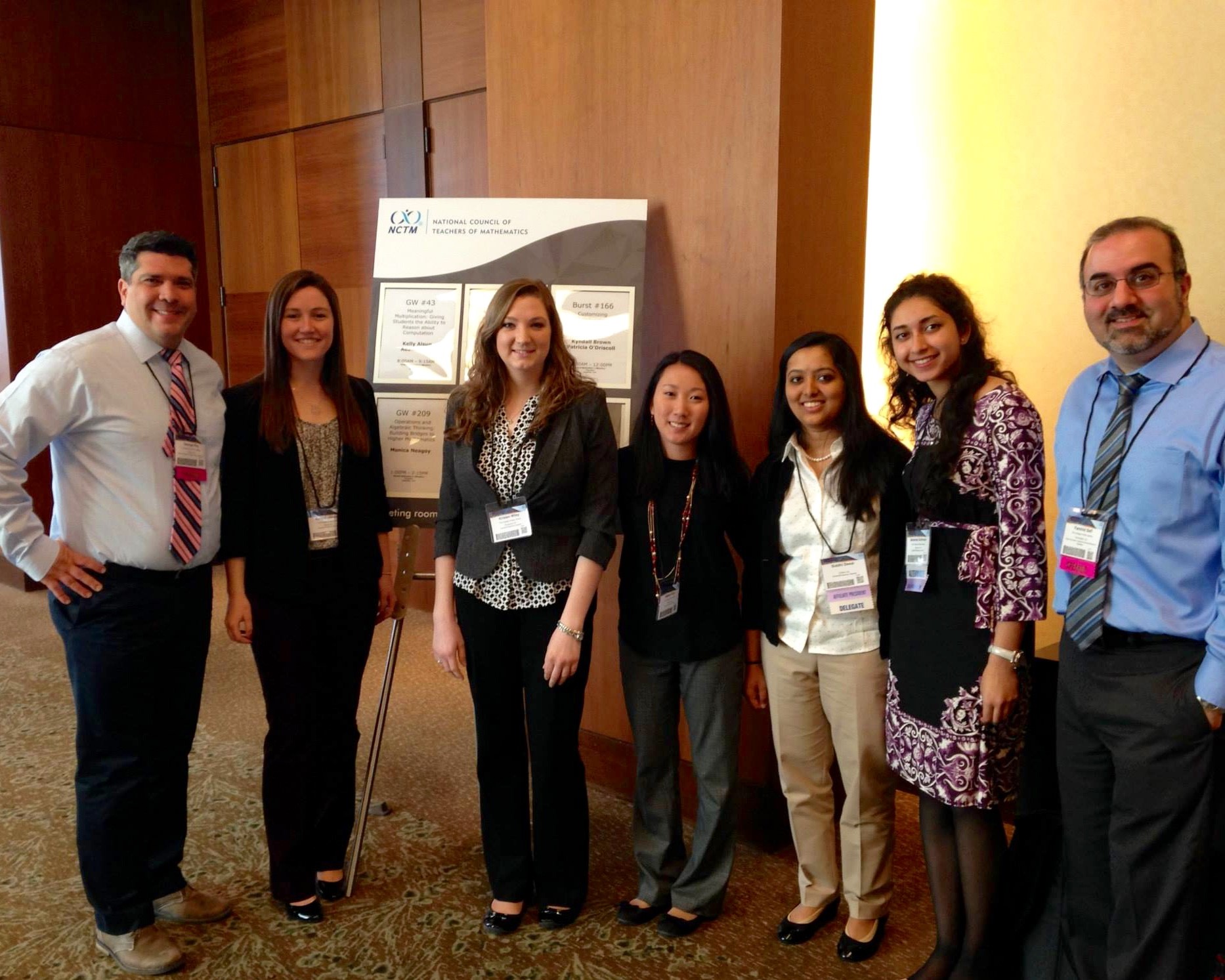 organization later received its official charter at the national conference in Boston in April 2015. “One of the best college experiences I have had was attending the NCTM Conference in Boston. In addition to receiving our official affiliate charter, it was pretty awesome meeting and attending sessions led by math educators whose journal articles I’ve read,” says Desai.
organization later received its official charter at the national conference in Boston in April 2015. “One of the best college experiences I have had was attending the NCTM Conference in Boston. In addition to receiving our official affiliate charter, it was pretty awesome meeting and attending sessions led by math educators whose journal articles I’ve read,” says Desai.
The club gives math education majors the opportunity to explore their interests as well as being part of an intellectual and vibrant organization. “As a senior math secondary education major, I was very interested in joining CSTM when it first came on campus because I knew it would be very helpful to me in pursuing a career in teaching middle or high school math,” says Stavroula Kontogiannis ‘16.
“CSTM being content-specific to math was what drew me towards the club,” says Jessica Martin ‘16. “I felt that the meetings and events would be not only beneficial to my career, but I also felt a sense of community among math education majors. I was extremely excited to be a part of the founding executive board because I felt that it gave me and my peers the opportunity to create something amazing for students. It is a support system that is beneficial to have when choosing classes to take, studying for the Praxis exam, or preparing for practicum experiences.”
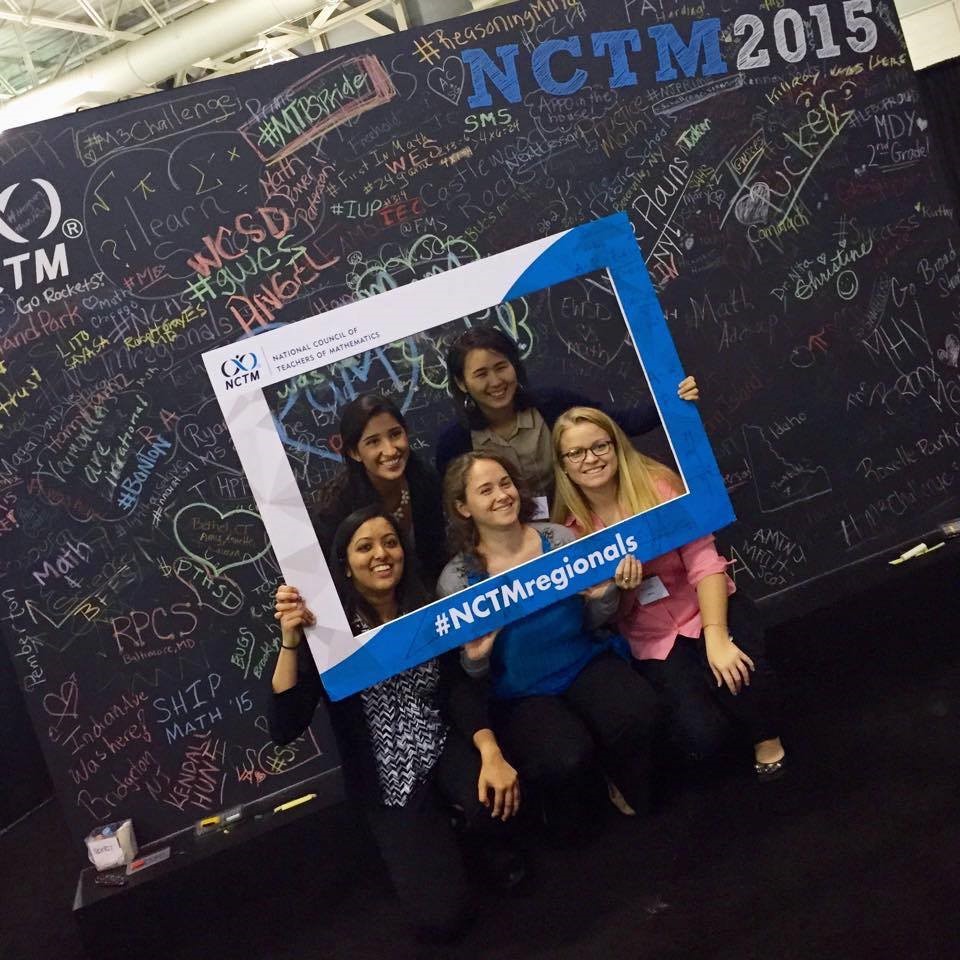 The members take pride in community outreach and volunteering on and off campus. “We just began Praxis Tutoring which I am very excited about. I lead one of the Math Content Knowledge groups,” says Martin. Kontogiannis adds, “CSTM volunteers at math education conferences, such as the NCTM and AMTNJ events. I had the opportunity to volunteer at both and we were able to listen in on lectures and talk to many math education representatives there.” CSTM Community Liaison Jennifer Stranz ’17 adds, “It was amazing to be surrounded by a group of people so passionate about math education. There were so many sessions available for future teachers of mathematics at any grade level. I have learned so much more about the profession since joining and have been exposed to great speakers and events.”
The members take pride in community outreach and volunteering on and off campus. “We just began Praxis Tutoring which I am very excited about. I lead one of the Math Content Knowledge groups,” says Martin. Kontogiannis adds, “CSTM volunteers at math education conferences, such as the NCTM and AMTNJ events. I had the opportunity to volunteer at both and we were able to listen in on lectures and talk to many math education representatives there.” CSTM Community Liaison Jennifer Stranz ’17 adds, “It was amazing to be surrounded by a group of people so passionate about math education. There were so many sessions available for future teachers of mathematics at any grade level. I have learned so much more about the profession since joining and have been exposed to great speakers and events.”
CSTM also hosts panels and discussions on campus, which allow for interactions between faculty and students outside the classroom, creating a vibrant and intellectual environment for future math teachers as well as a warm community between professors and students. “CSTM is a great environment to collaborate with peers and meet other future teachers. We also host a variety of speakers and are always open to new ideas for topics or presenters that the members would be interested in,” says Stranz. Kontogiannis adds, “The goal of CSTM is to create a sense of community among all math education majors, which I believe they have done very successfully.”
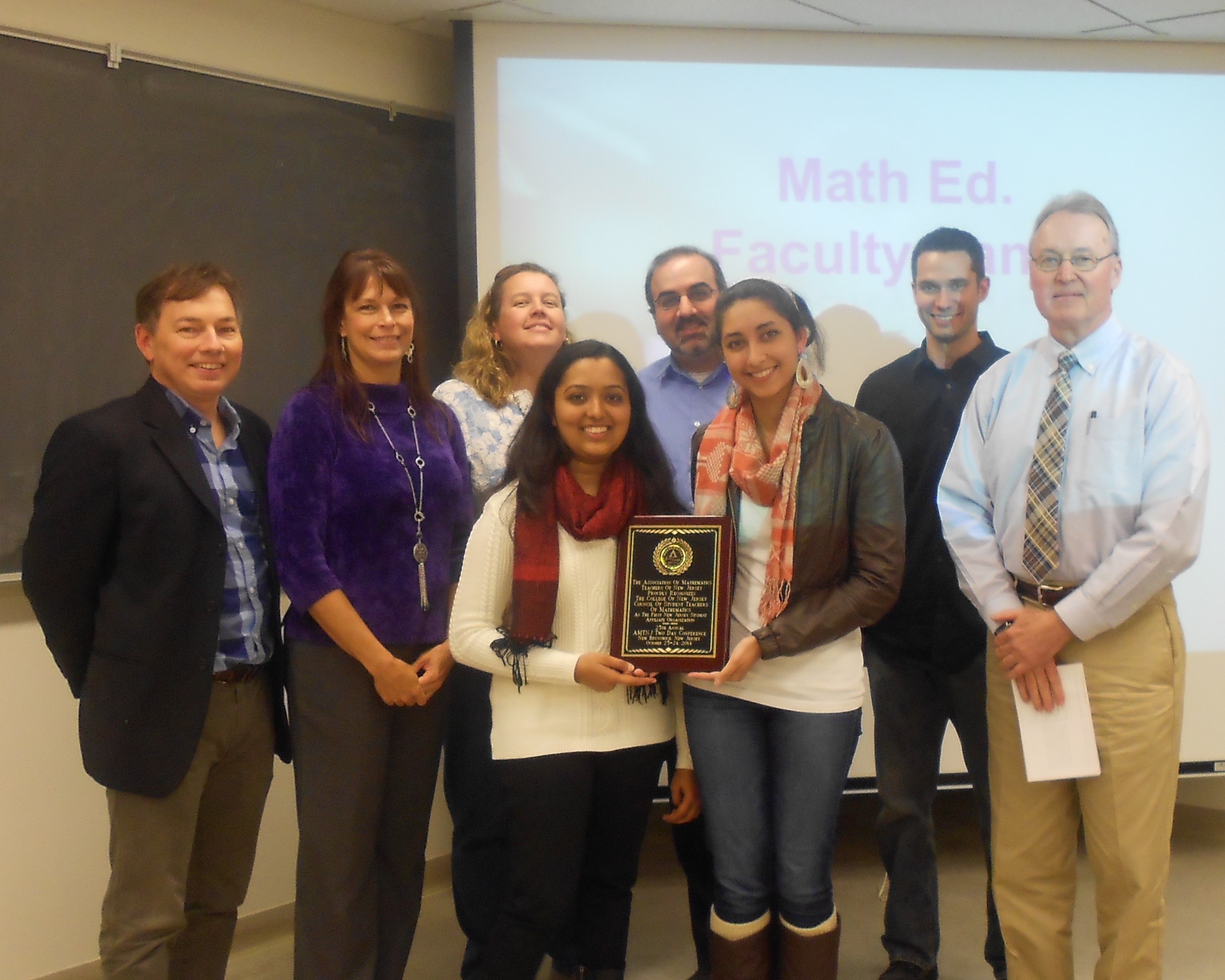 Some of these events have provided very useful information about the Common Core, Math Anxiety, and the Use of Technology in Math Education. There have also been other panels such as the TCNJ Math Education Faculty Panel, the Administrative Panel, and the Junior Field Experience (JFE) Panel. Martin adds, “I love it when CSTM holds panels. As math majors we are required to attend colloquium talks prior to graduation. While they are always interesting, I feel that they are so much more geared towards applied and pure math majors. Our panels give math education majors so much information and so many ideas,” states Martin. While the CSTM panels are geared towards math secondary education majors, all math majors are welcome to attend. “My favorite event was a professor panel as it gave students the opportunity to get to know our professors on a more personal level. It’s great to see them outside of an academic setting and learn about things they enjoy doing and how they got to where they are today,” adds Martin.
Some of these events have provided very useful information about the Common Core, Math Anxiety, and the Use of Technology in Math Education. There have also been other panels such as the TCNJ Math Education Faculty Panel, the Administrative Panel, and the Junior Field Experience (JFE) Panel. Martin adds, “I love it when CSTM holds panels. As math majors we are required to attend colloquium talks prior to graduation. While they are always interesting, I feel that they are so much more geared towards applied and pure math majors. Our panels give math education majors so much information and so many ideas,” states Martin. While the CSTM panels are geared towards math secondary education majors, all math majors are welcome to attend. “My favorite event was a professor panel as it gave students the opportunity to get to know our professors on a more personal level. It’s great to see them outside of an academic setting and learn about things they enjoy doing and how they got to where they are today,” adds Martin.
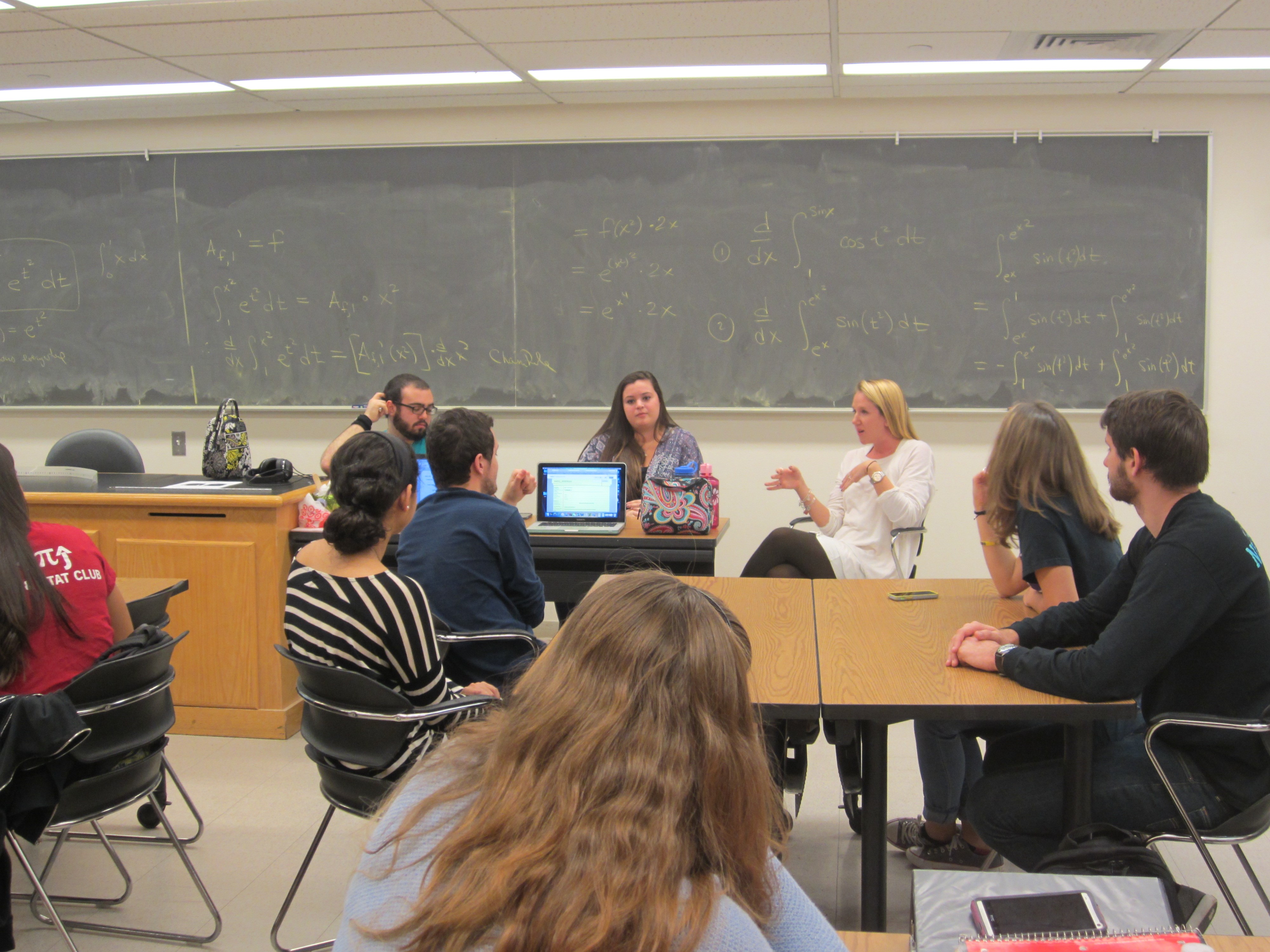 The JFE panel was especially beneficial as it gave members of the club the opportunity to ask questions about experiences, expectations, and more. Martin, who had gone through JFE, recalls, “We walked the students through everything that goes into the experience – from school placement to lesson planning. The most exciting part of being on the panel was being able to share my experience at Trenton Central West with students who will soon be there too. It is a great feeling to be able to give them advice and answer their questions honestly that they might be afraid to ask a professor.”
The JFE panel was especially beneficial as it gave members of the club the opportunity to ask questions about experiences, expectations, and more. Martin, who had gone through JFE, recalls, “We walked the students through everything that goes into the experience – from school placement to lesson planning. The most exciting part of being on the panel was being able to share my experience at Trenton Central West with students who will soon be there too. It is a great feeling to be able to give them advice and answer their questions honestly that they might be afraid to ask a professor.”
The group meets and organizes events once a month and currently has around 30 members with an active executive board of six members. CSTM works with two other math department clubs on campus – the Mathematics and Statistics Club and the math honor society Pi Mu Epsilon – to host one event each semester to create community for all math and statistics majors as well as faculty and staff. The executive boards of all three of the math clubs collaborate to plan a holiday party in the fall and a department picnic in the spring. “These faculty-student interactions help us form a close-knit community within the department,” adds Desai.
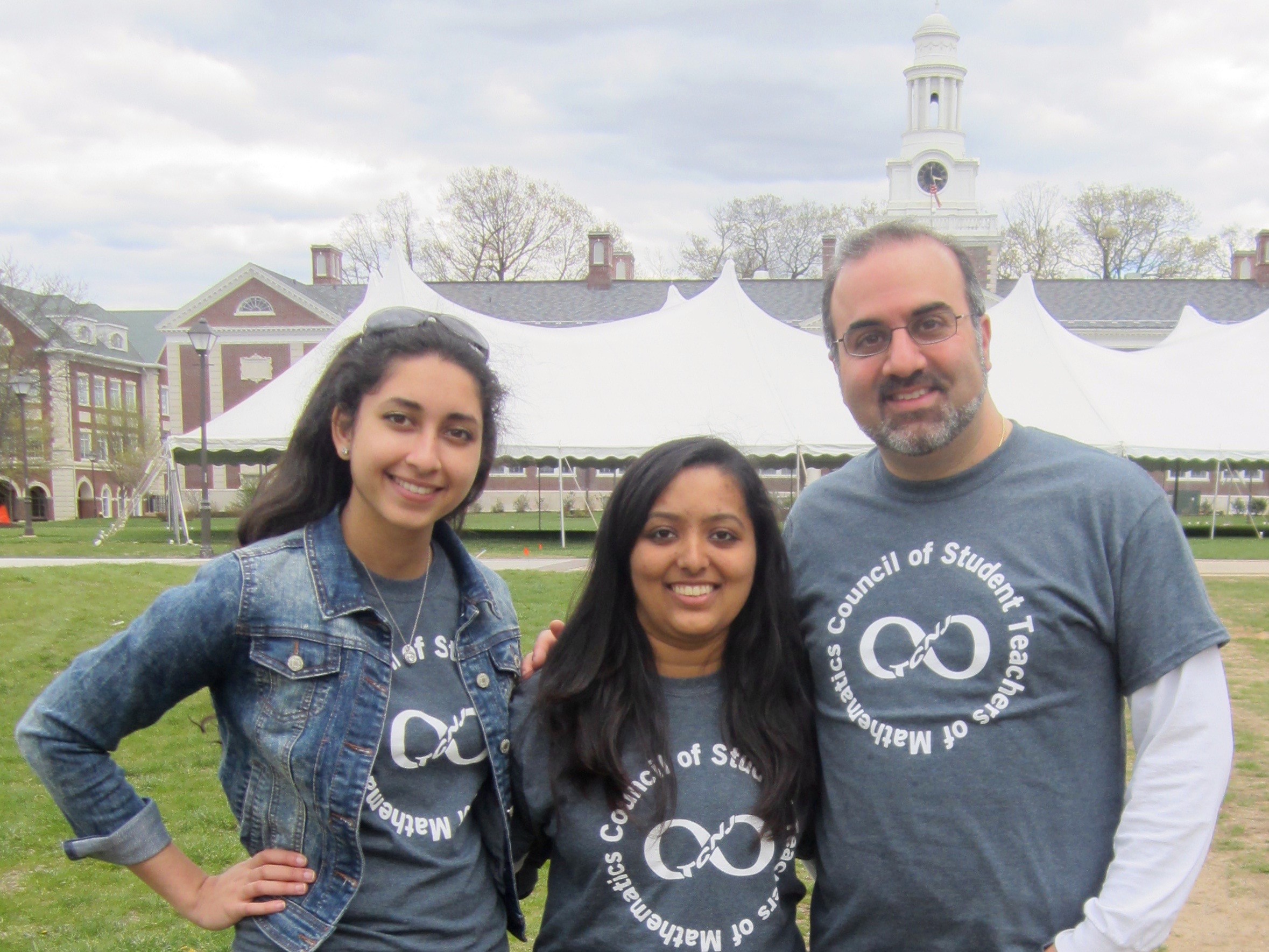 TCNJ is known for its small class sizes and approachable faculty, which are especially beneficial to future math secondary education majors. Soliman adds, “I chose TCNJ because of its welcoming, dedicated professors, small class sizes, and above all, for its experience-based pre-service teacher undergraduate program.” These unique experiences for math education majors start at the underclass level. Sophomores begin participating in tutoring or research practicums and, in the spring, they begin observing inside a classroom looking at a teacher’s approach and classroom culture. By junior year, students start learning methods of teaching through field experience. This exciting opportunity is not offered at other colleges until graduate school. “CSTM is all about creating a network for the math education community. Whether it’s getting to know professors, networking at conferences, or working with fellow teachers, students learn the value of collaboration and are better prepared to confront the daily challenges of teaching,” says Soliman.
TCNJ is known for its small class sizes and approachable faculty, which are especially beneficial to future math secondary education majors. Soliman adds, “I chose TCNJ because of its welcoming, dedicated professors, small class sizes, and above all, for its experience-based pre-service teacher undergraduate program.” These unique experiences for math education majors start at the underclass level. Sophomores begin participating in tutoring or research practicums and, in the spring, they begin observing inside a classroom looking at a teacher’s approach and classroom culture. By junior year, students start learning methods of teaching through field experience. This exciting opportunity is not offered at other colleges until graduate school. “CSTM is all about creating a network for the math education community. Whether it’s getting to know professors, networking at conferences, or working with fellow teachers, students learn the value of collaboration and are better prepared to confront the daily challenges of teaching,” says Soliman.
Clearly CSTM at TCNJ is leading the way for making math education inspiring for students. Kontogiannis says, “Other students should get involved in CSTM because of the great events, activities, and opportunities it provides. CSTM is a great club to be part of mostly because I have become friends with other members that share the same interest as me. We are able to come together at meetings and events and learn more about math education outside of the courses we take together. I would, without a doubt, recommend this club to anyone interested in math education.” Martin sums it up perfectly. “I strongly encourage all future teachers of mathematics in all levels – whether it is early education, elementary, or secondary – to come to our meetings and events so that we can better prepare ourselves to be the best teachers we can be.”
– Gabrielle Okun
For More Information:

